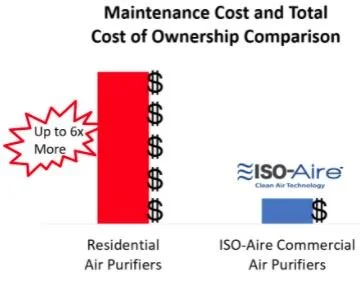The Hidden Costs of Residential Air Purifiers
With lots of companies marketing air purifiers out there, how do you know which one to pick? Many people are selecting residential air purifiers that claim to be powerful and effective while being inexpensive. And yet, there are many significant hidden costs associated with these models.
Residential air purifiers have many hidden costs and are less effective than commercial-grade air purifiers.
In reality, consumers will spend up to 6 TIMES MORE to maintain a residential purifier compared with a commercial-grade unit. Because of the short lifespan of residential HEPA filters and the labor needed to maintain the product, incremental expenses add up quickly. Initially, the lower price tag may be appealing, but residential air purifiers are spendy in terms of total cost of ownership because of frequent filter replacement and a shorter purifier lifespan. Furthermore, residential air purifiers have an inefficient design, leading to more electricity usage and added expense for the consumer. In addition to having higher energy costs, residential air purifiers are much louder and do not have the proper fan to effectively throw clean air throughout the room.
So how do our ISO-Aire commercial air purifiers compare?
An ISO-Aire 300RSF series air purifier with its 12” HEPA air filter next to a competitor model with its 1.5” HEPA air filter. The depth of a HEPA air filter matters not only for effectiveness of trapping particles, but also a filter’s lifespan. Thinner HEPA filters like that of the competitor’s have to be changed every few months. A thick HEPA filter like the ones in the ISO-Aire models last 5-6 years.
Our powerful HEPA filters are high-capacity with a long lifespan of 5-6 years. Compare this to residential filters which typically need to be replaced every 4 months.
The depth of the average residential HEPA is 1.5” deep vs. our 12” deep HEPA. Depth matters not only for effectiveness but also lifespan. Our larger media allows our HEPA to last longer than that of the thinner HEPA, which has to be replaced every few months.
On top of frequent filter replacement, there also comes monthly filter cleaning requirements with residential air purifiers, which can also lead to higher cost if paying an employee to do this. Our HEPA filters do not require monthly maintenance.
Our air purifiers also can expect a lifespan that exceeds 20 years, while residential air purifiers have a typical lifespan of 3 years.
This all adds up quickly and explains why you want to be careful when selecting an air purifier that has a lower overall cost of ownership.
ISO-Aire HEPA air purifiers come with many advantages, with our purification models designed for a diversity of room sizes. To learn more or to inquire more about our commercial units, contact us at info@iso-aire.com or at 651-265-0605.
Watch one of our experts describe the 3 main considerations when selecting a HEPA filter.



